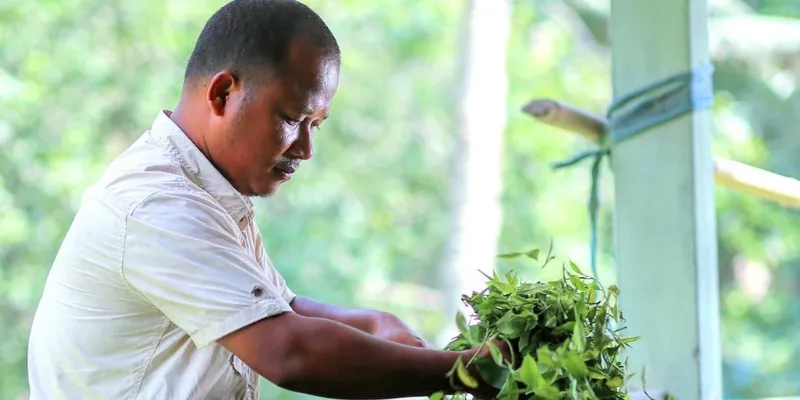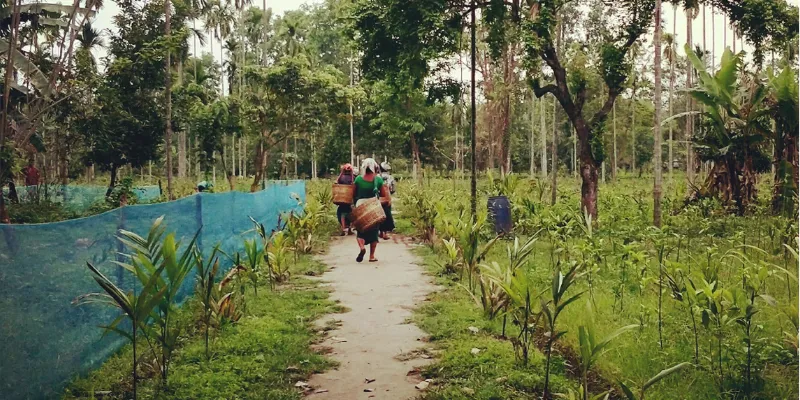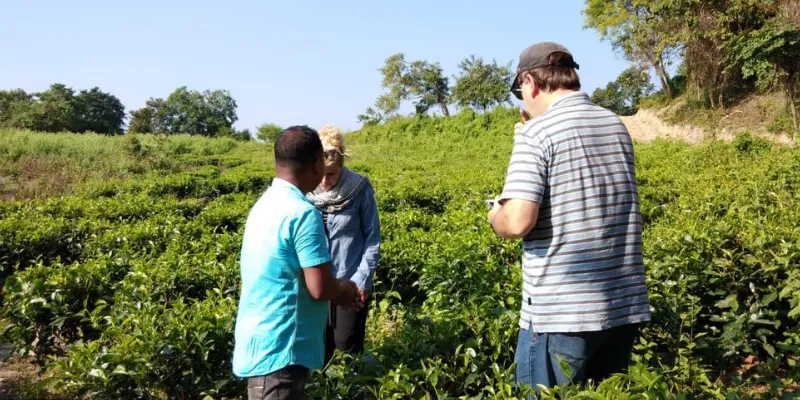Meet 28-year-old Tenzing Bodosa who turned organic tea into a fortune
Various shades of green and the chirping of birds greet you when you enter Tenzing Bodosa’s tea farm. There are areca nut trees dotting the tea garden, which is managed by 28-year-old Tenzing and his wife, and the smell of fresh tea leaves hangs in the air. Tenzing’s tea gardens produce three varieties of organic tea and enjoy an exclusive clientele that spans the globe.

Surrounded by his tea bushes in Assam’s Kachibari village in the Udalguri district, Tenzing tells us his story – of how he planted his own success.
The calm after the storm
Tenzing lost his father to a militant attack when he was just seven years old and had to take up odd jobs to help his mother, who was the sole breadwinner of the family. From working as a mechanic to operating machinery at a Malaysian construction company, Tenzing worked odd jobs until he took over his ancestral farm in 2006. Paddy and vegetables were the primary crops and the young farmer realised that these did not generate much income.
Assam is known for its tea cultivation and Tenzing decided to shift to growing tea. But, he wanted to do this differently and decided to replace all chemical fertilisers with natural products like cow dung and urine.
“Everyone starts their day with tea. When the same drink was being grown with harmful chemicals, its nothing but slow-poison being fed into your body,” he says.

To better understand how to use organic manure, he reached out to Dr L Narayan Reddy, an organic farmer from Doddaballapur in Bengaluru. He taught Tenzing composting and composition of ingredients that went into making organic manure.
“One family, one hectare, one cow – this is the easiest recipe an organic farmer must start with. The cow dung and urine from one cow can be redirected as manure for one hectare of land, and the produce through intercropping can be sufficient for one family,” Tenzing says.
Going big with organic tea
Assam is home to lakhs of tea farmers and the state produced 610.97 million kg tea in 2015. When Tenzing started growing organic tea in 2007, he was among the 12,000 farmers in the region who had taken the ‘organic route’. He set up a processing unit and slowly started expanding his business, which meant buying more land, extending cultivation and hiring more tea-pluckers.
“My parents owned a hectare of land, so that was a good start. In the first few days, we set up a nursery where we planted tea saplings, which was then transferred to the land. We hired three local tea farmers. Putting together this entire setting costed me one lakh rupees. Thereafter, with each earning we expanded our business,” he says.
Tenzing, however, soon realised that Assam was not a profitable market and when he tried selling his organic tea is other parts of India, the market was not ready for it as organic tea commanded a higher price. This is when a friend recommended he started looking at the international market.

A chance encounter led him to Canadian NGO 'Fertile Ground’ that was already working with tea farmers in the state. The organisation helped him export his organic tea and find new markets. “I still cannot comprehend how quick all this happened and in no time, I had dealers from Canada, Germany, the US, and the UK willing to sell my tea,” he says.
Today Tenzing has around 25 hectares of land and his annual revenue is around Rs 70 lakh. He grows three types of tea, including green tea and orthodox black tea.
Over the last 10 years, Tenzing has also trained many farmers on growing tea organically and most recently he hosted a workshop at the Startup India conference in Odisha.

Tenzing’s tea garden gives employment to 40 women and 35 men. While his wife overlooks the workers on the field, he manages the operations and finances.
The elephant foot
Tenzing’s farm also has an interesting distinction. It was certified as being the “world’s first and only elephant-friendly tea farm”, by the World Wildlife Foundation in 2015.
The region was prone to frequent visits by wild animals, mainly elephants and instead of launching efforts to keep them away, Tenzing decided to create an exclusive space for them.
“A herd of elephants and other wild animals would often enter our fields looking for food. They would break the fences, scare the employees, uproot trees and stamp away the tea plants. That is when the thought struck me – why can’t we all co-exist?”

He earmarked five hectares of land and planted trees that would attract animals and birds. Today, his visitors include deer, bears, wild pigs, rabbits, mongoose, peacocks, hornbills, robins, sparrows, and sunbirds, besides elephants. The geography has evolved into a mini forest and Tenzing grows bamboo, bananas, elephant grass, and elephant apples.
“Every evening, one can see a herd of elephants walking in and feasting on wild fruits and bamboo plants and this view reinforces why we all must find ways to stay connected to our nature and forests,” he says.







